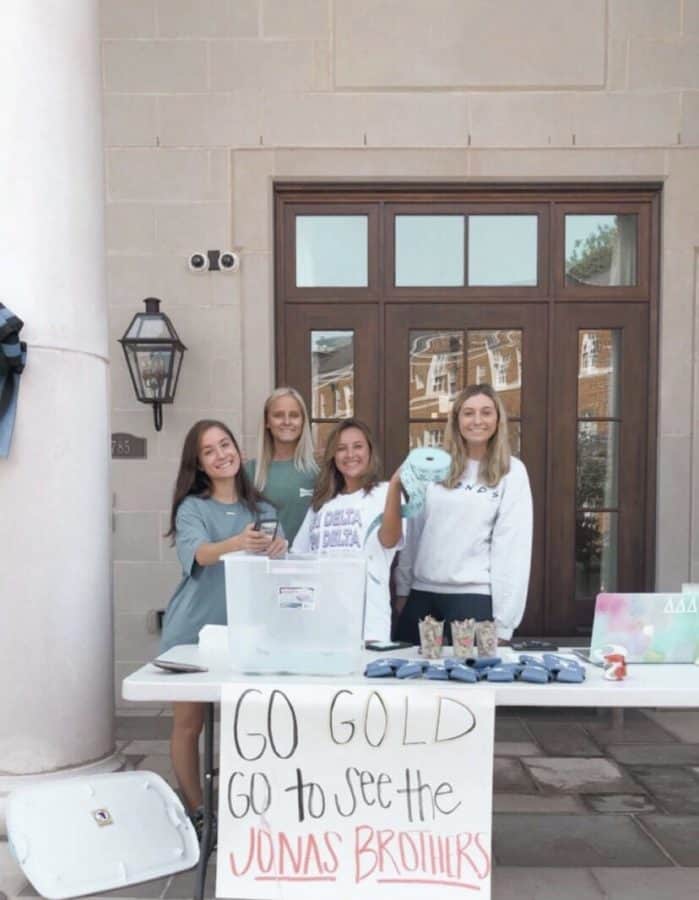Survivors and advocates come together to fight against childhood cancer
Submitted by Lexie West, taken by Alexa Pascucci. Girls pictured from left to right are Kelsi Bryan, Elise Spivey, Emma Thomas and Zoe McCarley
September 23, 2019
Childhood Cancer Awareness Month highlights the need for funding and research to end an illness that impacts approximately one in every 285 children in the U.S. UA students and survivors are advocating for a cure.
Kelsey Yarber, a senior majoring in public health, was diagnosed with cancer the summer of 2017 at 19 years old. Yarber had cancer for a year before it was found, and she went through about a year of treatment, which included two surgeries and radioactive iodine therapy. The seemingly endless trips to the hospital kept drawing Yarber back home to Massachusetts, but she continued to prioritize her education.
“I always knew the second I got diagnosed that I was going back to school,” Yarber said. “I was going to try to live a normal life as possible, and I really pushed myself sometimes to just keep living a normal life because I didn’t want cancer to take anything away from me. I know a lot of kids end up in the hospital for so long, and it’s so awful, so I just hope one day kids don’t have to have cancer. Every kid should get to grow up and be healthy.”
Before being diagnosed, Yarber said she experienced weight loss, was sleeping more than normal and overall did not feel right. She said she found herself sticking her tongue out while walking and could not find the reason why. She went to a doctor’s appointment to get the answers and they immediately found the problem.
Yarber’s lymph nodes in her neck were swollen to the size of a golf ball (on average they’re the size of a kidney bean). She said she immediately had to undergo a six-hour-long surgery.
“Sometimes people with cancer look healthy and you can’t see how sick they are, and sometimes they just want support,” Yarber said.
Today, Yarber continues to watch her health by scheduling scans frequently. Yarber has hopes that one day there will be a treatment for cancer that does not cause more cancer or bad side effects like they do today.
September is Childhood Cancer Awareness Month. Throughout the month, advocates increase awareness around childhood cancer through fundraisers, runs and gold ribbons. Approximately one in every 285 children are diagnosed with cancer before the age of 20 in the United States, according to the American Childhood Cancer Organization.
This statistic hits home for Lexie West, whose brother, Tyler, was diagnosed with cancer at the age of 6 in 2013. West, a junior majoring in biology, said her brother was a patient at St. Jude’s hospital and was declared cancer-free in 2015. However, it takes ten years to be in full remission; he is currently at the four-year mark.
West said she advocates year-round to bring awareness to childhood cancer.
“In general, it hits a lot more people than you realize, and it does make such a big impact not only on the patient, but on their entire family,” West said. “I know my family’s world was turned completely upside down.”
West said childhood cancer only gets 4% of funding from the national government, which is why it’s important to raise money so that researchers can get the funding they need to find new cures.
Katelyn Clardy, a junior majoring in marketing, is the co-director of morale for UADM and another student using their voice to address the need for awareness and support around childhood cancer. Clardy said her family back at home has been involved with fundraising for childhood cancer research efforts, and it is something that is important to her here at the University.
“90% of the kids in Alabama with cancer and blood disorders are treated at Children’s of Alabama, which is something that’s really stuck out to me because it’s so important to like me and my family,” Clardy said.
Clardy said she tries to sympathize with the families and children suffering from childhood cancer and believes it is something no one will truly understand unless they are going through it themselves.
“Not only is it emotionally draining on the family because I can’t even imagine having to deal with that as a parent or as a sibling of a child with cancer, but it’s also a huge financial toll as well, and that from times I think a lot of people don’t realize that is because there is so much money behind it, too,” Clardy said. “And a lot of these families can’t afford that and it’s sometimes the matter of life and death of their children.”
Beyond the month of September, Clardy brings awareness to the cause year-round.
“I have such a great group of people that we all work together to push for these kids and do everything we can for these kids, but I love to like talk to anyone about it, and whenever I get the opportunity to talk about Dance Marathon and Children’s Miracle Network, I’m always talking about it to everyone I meet,” Clardy said.








